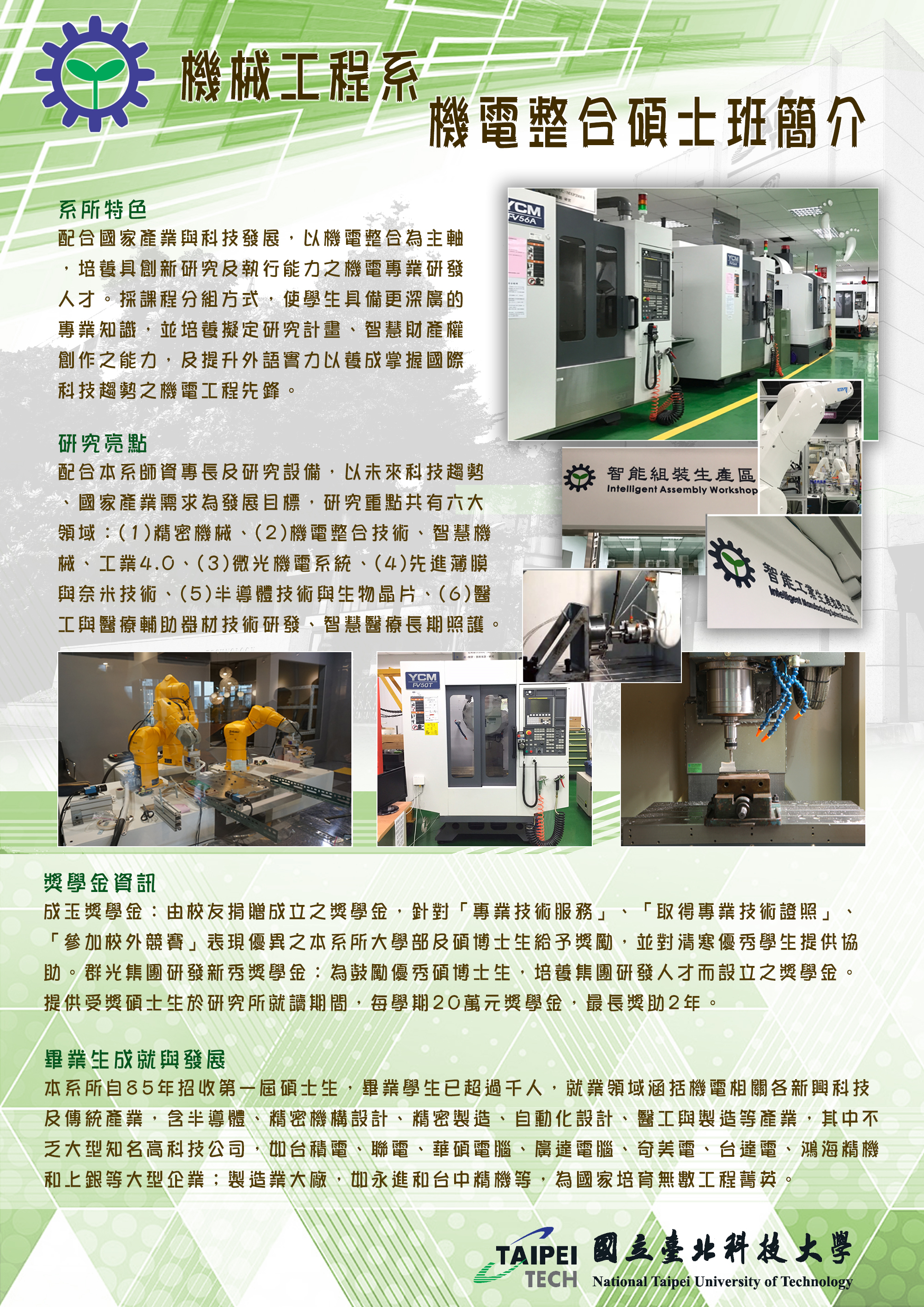
| 年代表 | 歷年大事紀 |
| 1911 | 本校前身「台灣總督府附工業講習所」創校,為國內歷史最悠久的工業學府之一。 |
| 1914 | 「台灣總督府附工業講習所」設立「機工科」,為本系之肇始。 |
| 1945 | 台灣光復,本校改名「台灣省立台北工業職業學校」。 |
| 1948 | 本校改制為「省立台北工業專科學校」,設立五年制機械工程科,招收初中畢業之學生修業五年。 |
| 1953 | 增設三年制機械工程科動力機械組,參加大專聯考招收高中、職畢業生。 |
| 1961 | 增設二年制機械工程科,分製造、工訓及汽車等三組,招收高工畢業生,修業兩年。 |
| 1963 | 工業工程組獨立招生成「工業工程科」。 |
| 1965 | 成立三年制機械工程科夜間部,仍為動力機械組,招收高中、職畢業生,修業四年。 |
| 1972 | 成立二年制進修專校機械工程科,週六晚上及週日上課,修業三年。 |
| 1981 | 本校改隸中央,更名為「國立台北工業專科學校」。 |
| 1985 | 增設二年制機械工程科設計組及控制組。 |
| 1987 | 因應國家經建需要,五年制機械工程科改招收雙班。 |
| 1991 | 機械工程科夜間部改修業三年,改稱為第二部。 |
| 1994 | 本校改制為「國立台北技術學院」,設立二年制及四年制機械工程技術系,分別招收專科及高工畢業生,畢業授與學士學位。 |
| 1996 | 成立「機電整合研究所」,畢業授與碩士學位。 |
| 1997 | 本系四年制之汽車組獨立成「車輛工程技術系」。 |
| 1998 | 因應改名科技大學,五年制機械科停止招生 |
| 1999 | 成立「製造科技研究所」,畢業授予碩士學位,首位所長為湯華興博士。 |
| 歷 任 所 長 | |
|
1996~1998
|
黎文龍 所長 |
|
1998~2001
|
王金樹 所長 |
|
2001~2007
|
林啟瑞 所長 |
| 2007~2010 | 蕭俊祥 所長 |
| 2010~2013 | 蘇春熺 所長 |
| 2013~2016 | 蘇程裕 所長 |
2016年起改制為機械工程系機電整合碩士班
智慧醫療器材組(110年老人醫工組改制)
隨著物聯網、雲端計算、大數據與人工智慧的發展,智慧醫療的概念隨之興起。本組之成立旨於結合基礎醫學、臨床醫學、資訊工程、力學、材料等工程領域,與長期合作的醫院如馬偕醫院、台北醫學大學附屬醫院、及各大醫院合作,以生物醫學問題為導向,使學生兼具生物、醫學及工程知識來克服生物醫學問題並培養學生具備跨領域之整合能力,希望能達到以下幾點目標:1. 培養醫學工程之專業知識;2. 改良並創新設計,如開發新儀器、生物晶片、客製化輔具等;3. 培養臨床工程師。輔導學生投入醫學工程相關領域之產業與研究,協助提升醫學研究的水準及國家的醫療福祉。
Program of Smart Healthcare Technology
With the development of IoT (Internet of things), cloud computing, big data, and artificial intelligence, the advancement of smart healthcare technology has also experienced a comparable rise. Our program is an interdisciplinary curriculum combining the fields of Medicine, Clinical Medicine, Information Technology, Mechanics, Material Sciences, and Engineering Sciences. In cooperation with Mackay Memorial Hospital, Taipei Medical University Hospital, and other healthcare facilities, we aim to support and advance patient care by applying biomedical engineering skills to healthcare technology. Students are expected to integrate biological, medical, and engineering expertise to address healthcare related concerns. The objective of our program is threefold: to strengthen fundamental knowledge of biomedical engineering, to innovate or improve existing designs for medical equipment, biochips, and customized assistive devices, and to cultivate skills required for a career in clinical engineering. Upon completion, students can utilize their proficiency in biomedical engineering to further elevate the standards of biomedical research and improve the welfare of our society.


